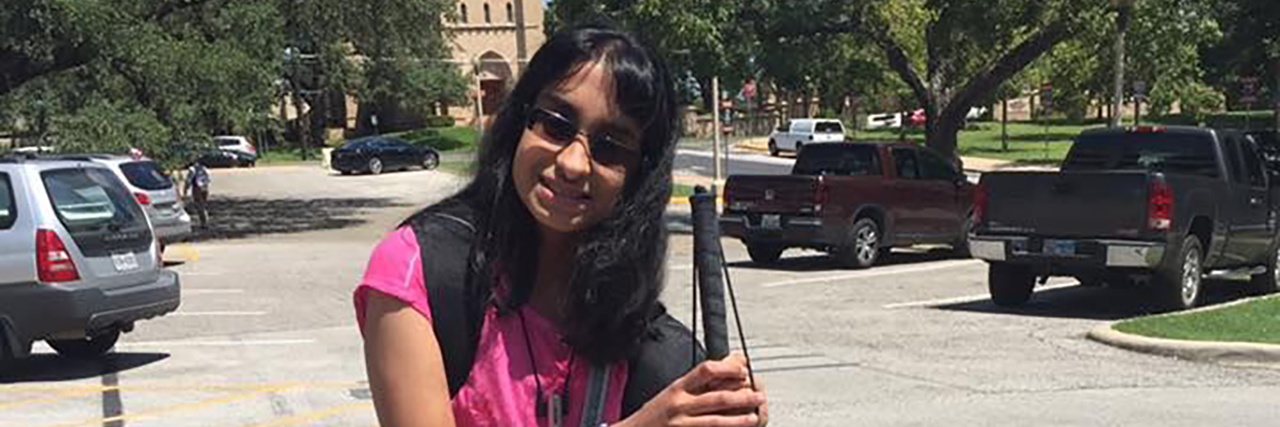As a society, we label people. Rich, poor and smart are but a few of the labels we unconsciously use every single day. Labels give us a sense of control and enable us to gather information, but they also box people into neat little categories. In that sense they also limit us. Let me explain. I am DeafBlind. I have CHARGE syndrome. These labels can seem overwhelming to observers. They can make me seem unapproachable. “How do you even talk to a Blind and Deaf person?”
Labels can obscure the person behind the label. Since I am writing this article to address the parents of children who have received a similar diagnosis, I would like to tell you my story. When I was born, the NICU doctor who diagnosed me told my parents “your child is severe-profound deaf, is blind with bilateral colobomas, and has paralyzed vocal cords.” They were part of my diagnosis, but these labels took on a life of their own.
Deaf, Blind, Mute. They just seemed insurmountable, a veritable Mt. Everest in front of my two hapless parents and associated members of my family. Many in my family were scared and shocked. Many just shut down and wrote my life off. Many looked at me with pity. “How do you even begin?” My parents heard the labels, took their time to digest them and but then saw right through them to the real me. They saw the mighty fighter in the tiny fragile infant hooked up to multiple machines and tubes. They heard the challenge in the hoarse cries, saw the determination in the dark eyes and felt the power in the tiny hands trying to pull out the irritating breathing tubes. They chose. They chose to focus on the person rather than the labels. My parents harnessed the information contained in the labels to provide therapy and medical care for me, but they never lost sight of the actual baby before them. They were scared, but then tried to reach out to all the resources they could: the internet, nurses, doctors, other parents and teachers, in order to help me.
I got fitted with BTE hearing aids at 2 months old when doctors ruled out cochlear implants. Believing communication was critical, my parents went to local classes to learn sign language (SEE 2). My mom took intervener training online to help me with tactile learning since my ophthalmologist was not sure about how my vision would develop. My dad glued pictures around the house to help me learn to use my residual vision. But in between all these doctor and therapy appointments, my parents found the time to take me out on walks in the stroller, hang out at the park and to simply have fun with me. In fact, now I really do not remember much about the surgeries, the scopes and the intense medical intervention, but I can still remember going out and catching ladybugs in spring, signing Brown Bear Brown Bear a hundred times a day, and visiting the public library to pick out my favorite books.
My parents made mistakes too. They were scared I would be isolated and would not let me discuss my disabilities with anyone. They thought they would wait and see how my vision would develop instead of teaching me cane skills right from the start. I use a cane now, but I am always uncertain in new places. But even if they did make some mistakes, they never lost sight of giving me a happy and fun childhood with great memories in spite of anxious moments of medical tests, ER visits and painful surgeries. They used all those scary labels as a starting point for information and worked with them.
As years pass, 19 of them to be precise, some labels have faded while new labels have emerged. My parents now have collected a few labels of their own: middle aged, grey haired, Ph.D. and manager. I have also earned a few more labels to add to DeafBlind: student, honor graduate, college freshman (hook ‘em horns!) and photographer. And I am proud of all of them because I am confident in who I am. Disability is just a part of me but not all of who I am.
Labels can be overwhelming. To a new parent they can be scary and paralyzing. Never let labels obscure the person or baby before you. Those neat little categories, those labels: they do not define the person before you. So to answer the question I posed: How do you even talk to a Blind and Deaf person?”
The answer: Just like with everyone else, you will find a way to communicate!
We want to hear your story. Become a Mighty contributor here.
Photo provided by contributor.

